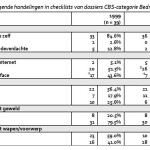De werkvloer van het Koninkrijk IX – Edward Heerenveen – Epiloog
 We hebben nogal wat meegemaakt Lammert de Jong en ik, in de tijd dat we als respectievelijk Vertegenwoordiger van Nederland en hoofd van de Regeringsvoorlichtingsdienst in de Antillen samenwerkten binnen het Koninkrijk. Het was een intensieve samenwerking in een periode waarin de verhoudingen binnen het Koninkrijk hoogte-, maar ook dieptepunten kende.
We hebben nogal wat meegemaakt Lammert de Jong en ik, in de tijd dat we als respectievelijk Vertegenwoordiger van Nederland en hoofd van de Regeringsvoorlichtingsdienst in de Antillen samenwerkten binnen het Koninkrijk. Het was een intensieve samenwerking in een periode waarin de verhoudingen binnen het Koninkrijk hoogte-, maar ook dieptepunten kende.
Nadat we beiden onze functies hadden neergelegd, keken we nog vaak terug op de roerige tijden die achter ons lagen. We lachten om de vele incidenten en belandden in diepgaande discussies over het waarom van bepaalde ontwikkelingen. Het idee kreeg vorm om onze ervaringen vast te leggen omdat het ons inziens een cruciale periode in het Koninkrijk betrof die wij van zeer nabij hebben meegemaakt. Het aanvankelijke idee was om in de vorm van een briefwisseling onze ervaringen uit te wisselen. In de discussies die daarop volgden, liepen we echter vast. Het bleek dat onze meningen zo ver uit elkaar lagen dat de potentiële lezer van onze publicatie er niet wijzer van zou worden. De Jong besloot tot een publicatie van hem alleen, een analyse van de verhoudingen gebaseerd op zijn ervaringen op de werkvloer. Read more
Moladi – Innovations in Affordable housing
Siemens Stiftung. July, 11, 2012. Decent housing is one of the key factors in the fight against poverty and social exclusion. It is not just about putting a roof over someone’s head. Academic research proves that access to a clean and stable home implicates an improvement in security, health and education.
Moladi, a South African based company, makes housing accessible to low-income people through innovative and eco-friendly technology. The Moladi system consists of a reusable and recyclable plastic formwork mould, which is filled with stoneless cement and a special chemical additive. This additive ensures that, once the mortar is set, the framework can be removed – and reused up to 50 times. According to the founder Hennie Botes, the brickless walls can withstand all types of weather. The formwork is lightweight allowing easy transportation. Due to the simplicity in design and the repetitive application scheme, construction costs can be reduced significantly. The Moladi model is not only cost-effective but fast, too: Botes comments that the wall structure of a house can be completed within one day. A further plus point, especially in remote areas, is that the construction does not require heavy machinery or electricity.
Read more: Empowering People Award. Siemens Stiftung.org : Moladi
Indiastat – Revealing India Statistically
Statistics on Slum Population, City Planning, Housing, et al:
Indiastat – Revealing India Statistically
India, Brazil And South Africa Address The Challenge Of Slums
The World Bank Institute. March 22, 2012
India, Brazil, and South Africa share common development patterns, economically, socially, and politically, and together can not only learn from each others’ successes and challenges, but also become major players in the geo-political space.
While Brazil has already achieved a high level of urbanization, tested different policies and approaches to address the slum challenge, and therefore can share many lessons of what has worked, what did not work, and why, it still struggles to address the extreme inequality between its rich and poor; it still has 44 million people living with inadequate urban housing or utilities.
India is one of the most rapidly growing economies in the world and has a large urban population although its urbanization level is relatively low. Faced with the challenge of improving the governance framework and service levels in cities, India has formulated groundbreaking urban policies in the last decade but despite these initiatives, its almost 93 million people living in slums will probably double in the next twenty years.
South Africa has made significant progress in designing progressive policies and intergovernmental fiscal transfer systems to address apartheid’s legacy of inequality. Although South Africa has delivered formal housing to 3 million households since the fall of apartheid, it recognizes that there is a lot still to be done to address the challenge of nearly 12 million people living in shacks or precarious shelters.
Read more: http://wbi.worldbank.org/india-brazil-and-south-africa-ibsa-addressing-challenge-slums
Centre for Affordable Housing Finance in Africa
The Centre for Affordable Housing Finance in Africa (CAHF) is the housing finance division of FinMark Trust, a non-profit trust with a mission of ‘making financial markets work for the poor’. The vision of CAHF is to be a primary source of information and debate relating to affordable housing finance in Africa, with a special focus on the SADC region. Our work covers three main areas: understanding the housing asset, innovation in housing finance, and monitoring housing sector performance. As a way to promote housing finance sector development in Africa, CAHF regularly commissions research studies; hosts forums; strategy and discussion sessions and workshops; and participates in local and international conferences and debates on housing finance. As a result, the Centre has become a credible source of information, thought leadership, and a point of contact for housing finance practitioners in both the public, private and NGO sectors, including private companies, donor agencies, policy makers and other stakeholders across the African continent. The Centre also provides strategic and secretarial support to the African Union for Housing Finance.
http://www.housingfinanceafrica.org/
South African Government – Department of Human Settlements
Housing
The Department of Human Settlements determines, finances, promotes, communicates and monitors the implementation of housing and sanitation programmes in South Africa.
Government has set itself the target of making a positive impact on the quality of life of 500 000 households by 2014, by upgrading informal settlements. The upgrade will provide households with security of tenure and access to essential services in sites that are close to economic and other social amenities.
To meet its objective of sustainable human settlements and improved quality of household life, the Department of Human Settlements has identified the following areas of priority:
- accelerated delivery of housing opportunities
- access to basic services
- more efficient land use
- an improved property market.
Between 1994 and June 2011, government built over three million homes for South Africans, giving shelter to over 13 million people.
Read more: http://www.dhs.gov.za/
Also: http://www.info.gov.za/aboutsa/housing.htm


